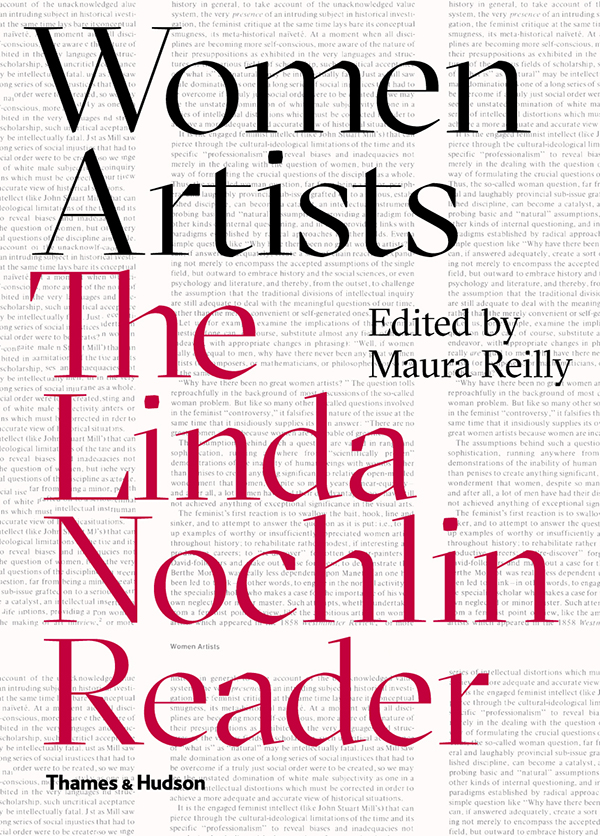Women Artists: The Linda Nochlin Reader (2015)
Filed under book | Tags: · art criticism, art history, feminism, painting, realism, sculpture, women

“Linda Nochlin (1931-2017) was one of the most accessible, provocative, and innovative art historians of our time. In 1971 she published her essay “Why Have There Been No Great Women Artists?”—a dramatic feminist call-to-arms that called traditional art historical practices into question and led to a major revision of the discipline.
Women Artists brings together twenty-nine essential essays from throughout Nochlin’s career, making this the definitive anthology of her writing about women in art. Included are her major thematic texts “Women Artists After the French Revolution” and “Starting from Scratch: The Beginnings of Feminist Art History,” as well as the landmark essay and its rejoinder “‘Why Have There Been No Great Women Artists?’ Thirty Years After.” These appear alongside monographic entries focusing on a selection of major women artists including Mary Cassatt, Louise Bourgeois, Cecily Brown, Kiki Smith, Miwa Yanagi, and Sophie Calle.
Women Artists also presents two new essays written specifically for this book and an interview with Nochlin investigating the position of women artists today.”
Edited by Maura Reilly
Publisher Thames & Hudson, London and New York, 2015
ISBN 9780500239292, 0500239290
472 pages
Reviews: Chris Kraus (NY Times, 2015), Publishers Weekly (2015).
Comment (0)Armand Mattelart, Seth Siegelaub (eds.): Communication and Class Struggle, 1: Capitalism, Imperialism (1979)
Filed under book | Tags: · aesthetics, capitalism, communication, communism, information, marxism, media, politics, socialism, theory

“Communication and Class Struggle, a two-volume work, is the first general marxist anthology of writings on communication, information and culture. Its purpose is to analyse the relationship between the practice and theory of communication and their development with the context of class struggle. Armand Mattelart and Seth Siegelaub, the editors, have selected more 128 essential marxist and progressive texts originating in over 50 countries and written since the mid-nineteenth century to explain three interrelated phenomena: (1) how basic social, economic and cultural processes condition communication; (2) how bourgeois communication practice and theory have developed as part of the capitalistic mode of production; and (3) how in the struggle against exploitation and oppression, the popular and working classes have developed their own communication practice and theory, liberated mode of communication, culture and daily life.
This first volume deals with the basic Marxist theory underlying the analysis of the communication process, as well as studies centered on the formation of the capitalist communication apparatus, ideology and ‘mass’ culture. It contains 64 texts. More than one-third are published for the first time in English, and some texts appear for the first time in any language. In addition, it includes an extensive bibliography with over 500 books on the subject.”
Publisher International General, New York, and International Mass Media Research Center (IMMRC), Bagnolet, 1979
ISBN 0884770117, 9780884770114
445 pages
PDF (37 MB, updated to OCR’d version on 2017-10-30 via Memory of the World)
See also Volume 2.
Michael Hardt, Antonio Negri: Assembly (2017)
Filed under book | Tags: · activism, assembly, autonomy, colonialism, commons, democracy, entrepreneurship, finance, labour, multitude, neoliberalism, organization, politics, protest, social movements, subjectivity

“In recent years ‘leaderless’ social movements have proliferated around the globe, from North Africa and the Middle East to Europe, the Americas, and East Asia. Some of these movements have led to impressive gains: the toppling of authoritarian leaders, the furthering of progressive policy, and checks on repressive state forces. They have also been, at times, derided by journalists and political analysts as disorganized and ineffectual, or suppressed by disoriented and perplexed police forces and governments who fail to effectively engage them. Activists, too, struggle to harness the potential of these horizontal movements. Why have the movements, which address the needs and desires of so many, not been able to achieve lasting change and create a new, more democratic and just society? Some people assume that if only social movements could find new leaders they would return to their earlier glory. Where, they ask, are the new Martin Luther Kings, Rudi Dutschkes, and Stephen Bikos?
With the rise of right-wing political parties in many countries, the question of how to organize democratically and effectively has become increasingly urgent. Although today’s leaderless political organizations are not sufficient, a return to traditional, centralized forms of political leadership is neither desirable nor possible. Instead, as Michael Hardt and Antonio Negri argue, familiar roles must be reversed: leaders should be responsible for short-term, tactical action, but it is the multitude that must drive strategy. In other words, if these new social movements are to achieve meaningful revolution, they must invent effective modes of assembly and decision-making structures that rely on the broadest democratic base. Drawing on ideas developed through their well-known Empire trilogy, Hardt and Negri have produced, in Assembly, a timely proposal for how current large-scale horizontal movements can develop the capacities for political strategy and decision-making to effect lasting and democratic change. We have not yet seen what is possible when the multitude assembles.”
Publisher Oxford University Press, 2017
Heretical Thought series
ISBN 9780190677961, 0190677961
xxii+346 pages
Reviews: Publishers Weekly (2017), Christian Fuchs (triple-C, 2017).
Comment (0)
